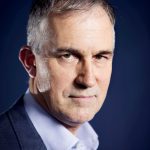Paul Hodgson was a founding father and former chairman of the AEJ UK and accomplished BBC producer and executive. He died on 10 March 2009 at the age of 85.
Gerry Mansell wrote:
Paul Hodgson, who died on 10 March at the age of 85, had a long and distinguished career in the BBC.
Bilingual in French and English and with a Belgian background, it was natural for him to specialise in the BBC’s foreign relations.
He started his career at Caversham Park as a foreign language monitor at the end of the war – where he met his wife Zorka, a fellow monitor – and moved to the Bush House Newsroom.
He later went to work as a producer on Panorama at BBC TV, specialising in European coverage.
He opened the BBC Brussels office in autumn 1970 at the direct request of the then DG, Charles Curran, when Britain re-applied to join the Community. His perfect command of French was a key factor in his appointment.
Subsequently, he moved to Paris as the BBC’s Representative.
He then came back to Caversham as Editor of News and Publications.
His final mission was as Head of French Language Services, for which he was eminently well qualified.
A jolly, convivial personality widely popular with the many in the BBC with whom he had dealings, he was in many ways the ideal appointment, whether in Caversham, Paris, Brussels or London.
He maintained friendly contacts with former colleagues after his retirement, and his range of friendships was a key factor in what was a long and successful career.
Roger Broad wrote:
Paul was a founding father of the UK Section of the AEJ who, with Maurice Woods, Stephen Hugh-Jones and me, set out in the freezing December of 1968 to Bad Hönningen, on the Rhine, to attend the annual congress of the AEJ, whose membership had been confined to the Six. Then, as for many years later, the Association was driven by Günther Wagenlehner.
This was, of course, the depressing period after de Gaulle’s second veto of British membership of the EEC, which Paul translated live on Panorama, and of the Prague Spring and its tragic outcome, again in which Paul was heavily involved for Panorama with colleagues such as Bob Elphick and Bob Rowland.
It was a low point in European affairs. The only encouraging sign – although not entirely clear at the time – was les événements in May 1968 in France that heralded de Gaulle’s departure.
The existing member sections made us welcome and suggested we form a British section, which has now just celebrated its 40th anniversary.
Paul was too frail to take part in our celebrations last autumn, but was pleased with the achievement to which he contributed so much, both as a chairman of our section for many early years and later as international chairman.
We all miss him a great deal.
I am particularly pleased that Gerry Mansell had made his own tribute, for both he and Paul shared a continental upbringing between the wars, ending in June 1940 when, in their late teens, both made fortunate, last-minute escapes from France.
Gerry ended the war as an acting brigadier at a remarkably young age and Paul, after being considered for dropping as an agent into Belgium, as a radio monitor at Caversham.







